Kiyoung Seong
Learning Collective Variables from Time-lagged Generation
Jul 10, 2025Abstract:Rare events such as state transitions are difficult to observe directly with molecular dynamics simulations due to long timescales. Enhanced sampling techniques overcome this by introducing biases along carefully chosen low-dimensional features, known as collective variables (CVs), which capture the slow degrees of freedom. Machine learning approaches (MLCVs) have automated CV discovery, but existing methods typically focus on discriminating meta-stable states without fully encoding the detailed dynamics essential for accurate sampling. We propose TLC, a framework that learns CVs directly from time-lagged conditions of a generative model. Instead of modeling the static Boltzmann distribution, TLC models a time-lagged conditional distribution yielding CVs to capture the slow dynamic behavior. We validate TLC on the Alanine Dipeptide system using two CV-based enhanced sampling tasks: (i) steered molecular dynamics (SMD) and (ii) on-the-fly probability enhanced sampling (OPES), demonstrating equal or superior performance compared to existing MLCV methods in both transition path sampling and state discrimination.
Energy-based generator matching: A neural sampler for general state space
May 26, 2025
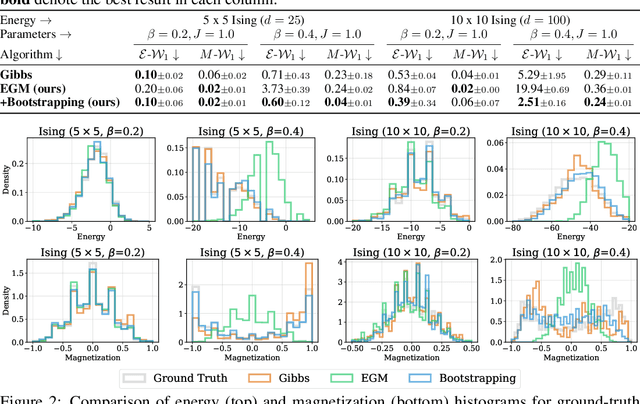
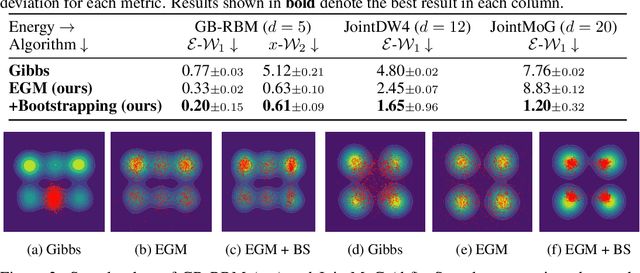
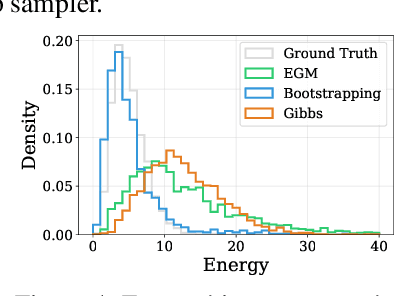
Abstract:We propose Energy-based generator matching (EGM), a modality-agnostic approach to train generative models from energy functions in the absence of data. Extending the recently proposed generator matching, EGM enables training of arbitrary continuous-time Markov processes, e.g., diffusion, flow, and jump, and can generate data from continuous, discrete, and a mixture of two modalities. To this end, we propose estimating the generator matching loss using self-normalized importance sampling with an additional bootstrapping trick to reduce variance in the importance weight. We validate EGM on both discrete and multimodal tasks up to 100 and 20 dimensions, respectively.
On scalable and efficient training of diffusion samplers
May 26, 2025Abstract:We address the challenge of training diffusion models to sample from unnormalized energy distributions in the absence of data, the so-called diffusion samplers. Although these approaches have shown promise, they struggle to scale in more demanding scenarios where energy evaluations are expensive and the sampling space is high-dimensional. To address this limitation, we propose a scalable and sample-efficient framework that properly harmonizes the powerful classical sampling method and the diffusion sampler. Specifically, we utilize Monte Carlo Markov chain (MCMC) samplers with a novelty-based auxiliary energy as a Searcher to collect off-policy samples, using an auxiliary energy function to compensate for exploring modes the diffusion sampler rarely visits. These off-policy samples are then combined with on-policy data to train the diffusion sampler, thereby expanding its coverage of the energy landscape. Furthermore, we identify primacy bias, i.e., the preference of samplers for early experience during training, as the main cause of mode collapse during training, and introduce a periodic re-initialization trick to resolve this issue. Our method significantly improves sample efficiency on standard benchmarks for diffusion samplers and also excels at higher-dimensional problems and real-world molecular conformer generation.
Collective Variable Free Transition Path Sampling with Generative Flow Network
May 31, 2024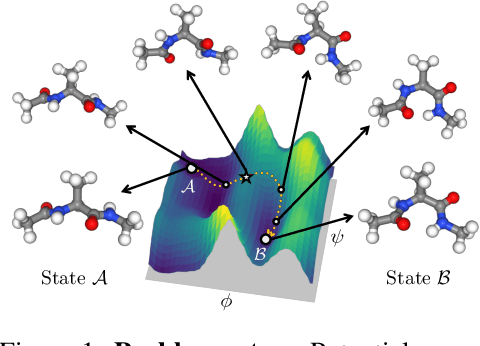
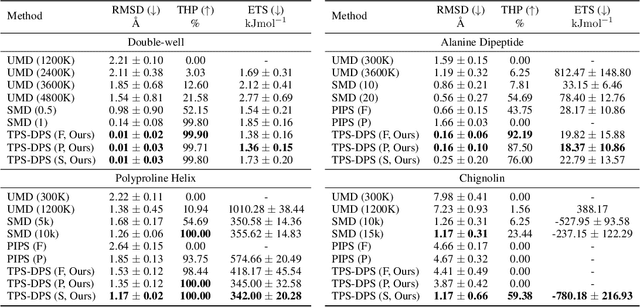


Abstract:Understanding transition paths between meta-stable states in molecular systems is fundamental for material design and drug discovery. However, sampling these paths via molecular dynamics simulations is computationally prohibitive due to the high-energy barriers between the meta-stable states. Recent machine learning approaches are often restricted to simple systems or rely on collective variables (CVs) extracted from expensive domain knowledge. In this work, we propose to leverage generative flow networks (GFlowNets) to sample transition paths without relying on CVs. We reformulate the problem as amortized energy-based sampling over molecular trajectories and train a bias potential by minimizing the squared log-ratio between the target distribution and the generator, derived from the flow matching objective of GFlowNets. Our evaluation on three proteins (Alanine Dipeptide, Polyproline, and Chignolin) demonstrates that our approach, called TPS-GFN, generates more realistic and diverse transition paths than the previous CV-free machine learning approach.
 Add to Chrome
Add to Chrome Add to Firefox
Add to Firefox Add to Edge
Add to Edge